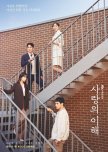
Deze recentie kan spoilers bevatten
Everyone Hates the Ending But I Don't
SPOILER ALERT: The K-Drama has an "open" ending to a sad, though intensely moving and involving, story. The main characters may or may not get together after the story ends--one isn't sure. I too would like to see a translation of the book to read its ending but, according to ChatGPT, "Understanding Love" has not been translated into English. We are told that the book indicates they do not reunite, but I think the writers of the K-drama intended a more uncertain ending.I find the English title of the K-drama, "The Interest of Love," to be odd. It's not a good translation of the book title, "Understanding Love." I'm not sure what it means. At first I thought it was a playful reference to the bank workplace setting of the series, because banks pay interest on deposits, although in that case it should be "The Interest on Love." Perhaps it refers to our fascination with love, and should be "The Interest in Love." The question is not an idle one, because at a crucial point in the series the leading characters, looking back, ask themselves if they were once in love, or merely overcome by the "interest of love".
As for the ambiguous ending, I agree with those who find strong hints in the finale that Su-Yeong (the woman) and Sang-Su (the man) will finally get together, or at least give their relationship one more try. (After all, they have never even properly "dated".)
I was touched by Su-Yeong's remark during the walk which ends the story that she had ghosted Ha Sang-Su because their relationship left "nothing more to give or receive." By this I take her to mean that their love had reached perfection, however briefly, in the Tongyeong "Guest House". The question is whether Ha Sang-Su can convince Su-Yeong that love is not continuous perfection, but rather "two people living day to day life together". One hopes he will. Otherwise she faces years of loneliness.
Sang-Su and Su-Yeong end the story as they silently approach the end of their walk up the collegiate "hill of oblivion," with their backs to us. They are not (alas) arm in arm, or even hand in hand. One of the series' haunting soundtrack songs ("Wonder Why") is reprised. In it the singer asks why his departed lover persists indelibly in his memory, why the dream of her cannot be erased (just as Sang-Su tells Su-Yeong he has forgotten nothing). In context the song is an ambiguous close to the series. The film ends before the song reaches a line from in its earlier appearances: "I don't want to love you like I used to." Is the omission a deliberate hint, or just the result of how long the credits ran? It's ambiguous, like this whole series and the relationship it depicts.
Vond je deze recentie nuttig?


